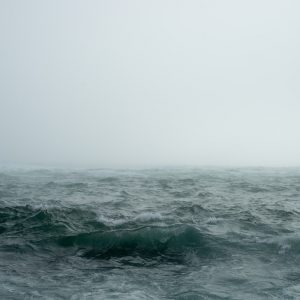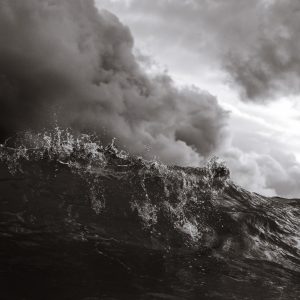Toe-curling things happen down at The Lake House. Sex, of course, and howling and injuries and a couple of disappearances, drownings, and once a kid hanged himself from the loft banister and another time a handful of teenagers tore out of there claiming that the walls had started bleeding, and no, they weren’t high, why would you even ask that.
People say things live in the lake. But of course, things live in the lake. Fish, April thinks, ducks, algae, frogs. Lakes always have things living in them. Not like this, people say. Not like our mermaid. The mermaid who doesn’t need air or water to breathe. No, she breathes souls, they say. She breathes death.
Climbing out of Tessa’s old car, darkness rushing in as soon as the headlights go out, April is struck by the oddest sensation of sinking, as if she were descending into something. The feeling makes her shiver, but she pretends it’s because she’s cold (yes, cold in the middle of July) and cuddles close to Tessa’s side as they approach the house.
Tessa lets her get away with it. In the dark, fireflies blinking all around them, The Lake House watching, Tessa might let her get away with anything.
Tessa’s the one who first told April about The Frenchman, one of the lake’s more colorful ghosts. Tessa’s version is the one where The Frenchman gets murdered by his lover’s husband. The jealous husband caught them fooling around at The Lake House and, in a crimson rage, beat The Frenchman bloody and dumped him in the lake to drown. Delighted by this offering but disturbed at how dented and warped his face had become, the lake’s mermaid began piling mud into his mouth and into his mouth and into his mouth, trying to fill his face back into its original shape. He’s called The Frenchman, Tessa explained, because of the way his mouth hangs open now with all that mud. As if hungry for a kiss, for tongue.
(For life, she whispered.)
Everything about The Lake House is hungry. No one’s arguing with that. This random house that’s always been there, standing guard at Kingdom Lake, yet never owned by anyone. A house that’s always empty right when you need it to be. A house that leans a little, like a smirk.
Just behind the house: the lake itself. Dark trees huddle about the water like worshippers, their empty spaces curling with silver fog—an entity that seethes. But the lake does not seethe or wrinkle or undulate. Beneath the wisping fog, the lake is a glassy black stillness, as black as the darkness surrounding a lit keyhole. If April pressed her eye to this keyhole to spy on the brightness within, if she pushed her face as close to it as she could, pushed below the water itself—she releases a pent-up breath. She clutches Tessa’s hand extra tight. For a moment—and it’s dumb, of course, so stupid—but she was sure she heard the lake speaking to her. She was sure she heard a voice whisper, You never have to hold your breath with me, lovely girl.
When April’s nervous like this, she thinks about where she wants to put her first tattoo. The silhouette of a centaur against a spindly, black tree. Maybe on her shoulder or over her left breast. She can’t get it until she turns eighteen, still another two years away, and thinking about it reassures her that that day will still come. She’ll be fine, nothing’s going to happen, she’ll live. She has to. She hasn’t even gotten her tattoo yet.
All at once they’re at The Lake House’s gray wooden door. All at once it’s open. That’s it. They’re inside.
The walls stretch up around them and April’s struck once more by the sensation of descent, as if they were stepping down into the lake outside instead of stepping up through the house’s front door.
The walls are carved with hundreds of hearts, initials, and dates—a vast sexual history that wraps eagerly around you as soon as you step within. April can’t help but think of the memorials they saw on their school field trip to DC. So many bright names etched into so many dark walls. Not all ghost stories are romantic.
April squeezes Tessa’s hand; Tessa must be wearing a dozen different rings, and April relishes the bite of each one against her fingers. Tessa squeezes back, grinning a grin that says a lot of things, some of them a little mean, but April doesn’t mind. The meanness is part of what April likes about her.
“You’ve really never wanted to come down here before?” Tessa elbows her. “Not even with one of your boyfriends?”
April pulls her long brown hair into a rope over her left shoulder, twisting it. Tessa’s a lesbian, April’s first girlfriend. You can truly be yourself with me, Tessa once told her, and all April could think was, I was myself with them, too. Still, Tessa does make her happy in a way she’s never been before. Tessa makes her feel exhilarated, powerful. Tessa gets her to agree to things she never would’ve thought herself capable of, things like coming to The Lake House to add their names to the wall.
April felt sure this was a euphemism at first but then wasn’t so sure and now hopes it is and dreads it might be, and she’s saying, “You don’t think it’s a little weird? Being in someone else’s house.”
Tessa takes out her pocketknife, the one in the shape of a mermaid, and gestures with it to all the names staring down at them. “The Lake House belongs to everyone.”
April tries not to focus on any particular name. It scares her more than she’ll admit: the idea of seeing her brother’s name on the wall. He’s away in Iraq now, living around people she’ll never meet but who he might kill or be killed by. She doesn’t know how far the mermaid’s reach might extend. Keeping the names unfocused, she pretends they’re just a strange pattern in the woodgrain. Nothing at all to do with sex or death or history.
Tessa presses a kiss to April’s fingers and says the fateful words: “C’mon, I wanna show you something.”
Tessa is a character. She’s white, like April, and dyes her hair an even starker white, leaving her eyebrows dramatically dark by contrast. She loves baseball and Mads Mikkelsen and SullyWise, the contortionist who famously went missing two years ago when the circus came through town. “SullyWise didn’t go missing,” Tessa will tell you. “She folded in on herself until she disappeared.” Tessa’s sternum is pierced with a pair of silver studs; they only show with certain tops, like the one she’s wearing now. She loves romance novels but hates the words “dewy,” “folds,” “creamy,” and “spunk.” Tessa acts all confident, but April knows things about her. She saw her in the girls’ bathroom last fall. Tessa has secrets. Tessa’s a lake, too.
“Show me what?” April asks, pretending not to know. The stairs creak beneath her old cowboy boots and she wonders which banister that kid hanged himself from back in the ’80s.
The house has a mustiness that reminds her of her father in a way she really doesn’t like. The various rugs are worn and thin, patchy like the fur on the moose head that lurches above the fireplace. And all around them as they ascend/descend the stairs: Claire + Sam, Josie-hearts-Rob, Tom & Fiona & Kim, R + H, Spitters R Quitters, and the more April tries not to focus on them, the more the white etches look like claw marks or scratches at the inside of a coffin lid. Bright flashes of movement beneath dark waters.
Maybe she’ll get the tattoo on one of her thighs, or across her lower back.
“It’s in the bedroom,” Tessa tells her, and something about the word bedroom wraps around April’s chest so tightly that she can hardly breathe.
April knew this was coming; coming is the whole idea. She’s never had sex with a girl before, but she’s excited, and nervous, and this is fine, this is great. Tessa’s wonderful, sexy, funny. They’ve been dating a couple of months now, they’ve already had their hands all over each other, inside each other. Mouths are different, though; hands may play, but mouths only know how to drink and devour, how to breathe in whatever’s given them to breathe.
Tessa doesn’t know this—or maybe she’s sensed it—but April’s never done oral with anyone before. It always struck April as more intimate than other kinds of sex, more personal somehow. She fantasizes about it, sure, but the actual doing of it—she’s nervous she won’t taste right.
Perhaps oddly, perhaps not, she isn’t nervous at all about taking a taste for herself. She’s always loved the idea of consuming someone, of feeling them come ecstatically apart as she does so. There’s the rub, she supposes. The difference between eating and being eaten.
“The Lake House will be the perfect spot,” Tessa told her. “Mermaids are the perfect symbol for you. A good omen.”
“Symbol? What are you talking about?”
“Half lady, half fish,” Tessa explained with a grin, and April got the joke only slowly, oh, because I’m bi. Half this, half that. Which “half” of her sexuality was meant to be the fish, April couldn’t guess and didn’t want to try. Tessa laughed and April followed suit. Tessa’s been out for years. Loosen up, April reminded herself. It’s just a joke.
“C’mon,” says Tessa, winking at her. “I promise I won’t bite,” says her mouth.
And before April can say anything at all, there they are, at the bedroom’s door.
Despite her best efforts, April’s been imagining a ghost-bride type room, peeling wallpaper and cloudy mirrors, decrepit silk and elaborately framed oil paintings of wan, tragic women. But really it looks like frat boys just dredged up garbage from the bottom of the lake: a large, lumpy bed made up with a stained floral blanket, a general stink of beer and mold, a ragged deer head leering out of the wall, and a pair of laminate nightstands, each topped with a (broken) slag glass lamp. The fog has let itself in through an open window, making itself comfortable about the bed.
Maybe this gust of unimpressive reality should make the entire situation easier to handle, funnier and less romantic, but instead, it all feels more intense. People come here for sex. They have come here for sex. April squeezes her arms around her middle; maybe she could get the tattoo on her hip.
“Is this normal?” she says. “An abandoned house with all this stuff in it?”
Even as she asks the question, though, an odd part of her knows absolutely: The Lake House has never been abandoned. It belongs to the ghosts. To the mermaid who breathes them in. The mermaid who lives in the lake, or the house, The Lake House, a house lake, a lake made of house, a house made of—“Here it is,” Tessa says, waving April over to the bed. The fog makes room for Tessa, closing around her in a way that makes April feel seasick.
Tessa sits on the bed, maybe hoping to be alluring, but then quickly stands again. April pretends she didn’t notice. Tessa fiddles with the studs at her chest the way other girls might fiddle with a locket. “See it?” she says, softer now, and points with her pocketknife to a section of the curved headboard, a spot marked with: XR Dreams In KJ. “That’s him. The Frenchman.”
“Oh really?” April aims for cool. “And how would you know? You said you’d never been here before.”
“My sister told me about it,” Tessa says. “I thought she was shitting me, but these are definitely his initials. I can feel it.”
April knows what she means because suddenly she can feel it, too. The realization like a stiff feather sliding down her cheek, spreading goosebumps.
“And look here,” Tessa says, tapping her knife against a slanted SW. “Guess who.”
April shrugs, cradling her elbows. “Who?”
Tessa grins and it’s pure sex. The bed is all but pulsing beside her, emanating heat. “It’s our very own SullyWise,” she says. “Just imagine what positions she folded herself into on this thing.”
But April doesn’t want to imagine that, nope, no thank you. She doesn’t want to imagine The Frenchman with his face bulging full of mud. SullyWise bent backward into a bony, fuckable knot. If the mermaid hadn’t liked the look of The Frenchman’s beaten face, April doesn’t want to know what measures she might’ve taken to iron the tangles out of SullyWise.
The back of my neck, April thinks. If she keeps the tattoo small, she could probably fit it there.
“So, where do you want to do it?” Tessa says, and all April can think is, Not here. I want to, I really really want to, but not here. Tessa laughs a little, the kind of laugh that’s deep in her chest and reminds April that, one day, Tessa will be a woman in her forties, seated comfortably in her full power, and dear god, how irresistible she’ll be then; it’s too much to even think about, overwhelming. Finally, Tessa takes pity on her: “I mean carve our names. Where do you want to do it?”
April releases another pent-up breath and almost laughs at herself, but the voice is there again, right at her ear, as chill as the curling fog, You never have to hold your breath with me, lovely girl. April can’t tell if it’s a man’s or a woman’s voice. Both, she realizes. Both, all, yes and. April closes her eyes. She’s breathing in wet mouthfuls of fog (how did it drift all the way up here?), and Tessa’s waiting with her knife at the ready, and anxiety wrestles about April’s body anew, gripping tighter and tighter. Because signing your name means something. It’s an agreement. A pledge. Keep your name out of Jack Slim’s book, her grandmother used to say. Jack Slim—April can’t remember where Oma got that name for Satan. Jack Slim’s always hungry, she would say. Jack Slim loves nothing better than to eat a little girl’s soul.
“I don’t know,” April says, meaning: I don’t know about this, but Tessa must’ve heard: I don’t know where we should do it, because she takes April’s hand again, all those rings prickling against their fingers, and says,
“I know just the spot.”
April’s following her out of the room and the fog comes with them. A shadow moves on the wall, and she refuses to wonder if it might be SullyWise crumpled up and crawling like a spider. SullyWise who signed her name to the house. And now they’re going to sign themselves over as well. They’re going to belong to the house, too. To the mermaid. Like that kid who killed himself, like all those people who drown in the lake every couple of years, like The Frenchman. She’ll be just another name on another memorial wall, except all the tourists who come to see it will rush to add their own names to the list, even those who escape will forever feel that slight maddening itch at the back of their brains, and the bodies will keep piling because it never ends, her brother isn’t coming home and why did he leave in the first place, just another name on a wall, it never ends, it never stops, and “What?” Tessa asks, looking down at April’s clutching hands, her stone-still legs. “What’s wrong?”
“I,” but what can April say, how can she explain. Lying is much easier. “What’s the point of carving our initials in here? Everyone else has already done it.” Up the ante, she decides; that’s always the quickest distraction. “I don’t want our names on anything but each other.”
The points of Tessa’s smile look so sharp, it’s easy to imagine pricking your finger on them. “You mean like a tattoo?”
“No,” April says—and then she hits on it; what really does seem like the winning idea, a match-strike, what will get them out of the house the fastest, right this instant, away from the names, from the bed, even if it takes a bit of pain to do it—“I mean like a blood ritual.”
They’re outside in no time, as if the house melted from beneath their feet; a sandcastle dragged quietly out to sea. To the lake. It’s cool here. The fireflies are fewer now that it’s so late, but a handful still blinkers on through the fog like tiny lighthouses.
Tessa’s pocketknife is out, the small blade pulled from the mermaid’s body like a sharp, silver soul.
They haven’t discussed anything, have come to no agreements, yet both of them have their white hands stuck out into the purple darkness, palms up, ready to be bloodied.
“You know, this really isn’t what I had in mind when I suggested we come out here tonight,” Tessa confesses, fiddling one of her piercings.
April tries to laugh but can’t quite manage it. She thought it would be easier out here, in the open air, but nothing about the lake feels open. Somehow, they’ve only swum down deeper. She hates the idea of cutting herself. Of blood dripping everywhere. She doesn’t like the idea of being naked, either—her body’s fine, really, it’s just that she doesn’t like it and sometimes she hates it—but she says, “Should we just skip the knife and skinny dip instead?”
“Oh, what is it, baby?” Tessa teases, stirring the fog with her knife. “Afraid of something permanent? You can’t keep stalling forever.”
It’s possible Tessa doesn’t mean anything by this—even in the heat of the moment, April sees that—but it doesn’t change the sting April feels because of it, the veiled accusation that perhaps only she can hear.
“Oh, stop your fretting about it,” April once overheard her oma say to her mother, trying to comfort her. “It’s no coincidence that her brother goes off to war and suddenly she declares she’s gay. Kids need attention. It’ll pass.”
Sometimes, late at night, April worries she’s only dating Tessa as her proof, her evidence that she’s bi, and wonders why her ex-boyfriends don’t feel like proof as well; why they feel like marks against her instead. She clutches herself against the vining thoughts, but it’s no use, they drag her under again, every night. She wonders if it’s normal to be so unsure of one’s own motives and desires, the details shifting around, everything murky and swirled and variable, as if she were an urban legend of herself.
“What was that?” April asks, looking out across the water. It’s her favorite moment in every horror story—What was that?—but it doesn’t feel so fun right now. It was a splash, she’s certain she heard a splash. The chill from the lakeshore mud bleeds through the soles of her boots. The fireflies are gone. The trees bow lower, genuflecting to the water, and April wonders once more what it would be like to press her face to this keyhole, to bend closer to the water until she could spot who was moving around within it, just for a moment, just a peek, no one will ever know. It’s not spying if it’s your own room you’re peeking into, a voice whispers, and there, April can see her, a woman twisting nimbly inside a lavish wavering chamber, a woman with a fish’s tail and flowing hair, a woman with her mouth open, just a bit, whispering, yes, lovely girl, you can truly be yourself with me.
I’m not like you, April says. I’m not half this and half that.
Neither am I, replies the mermaid, and her smile is so soft, as soft as mud, as lovely as moonlight, and for once April doesn’t mind the sensation of sinking deeper. There’s something so perfect about relaxing into this voice, so natural about it as she says, I’m not half anything, lovely girl. I am my own creature.
Yes, April says, startled by the rightness of it. Yes, exactly.
You never have to hold your breath with me, says the mermaid. You never have to hold anything back with me. All you have to do is sign your name.
April reaches out and her fingers find the mud, no knives necessary in this water-softened world. She wonders how far back SullyWise could’ve bent if her body had been made from this watery place, if she could’ve soaked till her bones were noodles and her skin as pliant as algae. April smiles at the lush feel of it all, the smile opening her mouth, and yes, says the mermaid, yes, you’re so fresh, breathe, drink me in, but April’s gasping instead of gulping, hands grasping her, pulling at her, and the mermaid’s shriek is so piercing April can hardly understand a word out of Tessa’s mouth as she says, “Fuck! April, stop it! You’re scaring me!”
April’s soaked. Tessa’s soaked. Her head was in the water, her chest, her arms, she was in the water, fully dressed, and “I kept trying to pull you out, but you just kept sinking—like you were being dragged, like you were—” and Tessa’s terrified, that’s plain to see, her chest heaving and those piercings glinting in the moonlight, her knife discarded in the mud.
April reaches a hand back into the dark water without meaning to, without discussing it with herself, and Tessa snatches it back out again, abruptly furious. “What the hell, April! What was that!” Tessa pushes wet clumps of white hair out of her face. She looks very much like a drowned ghost bride, and April almost giggles at the thought before a violent cough grips her, lake water choking out of her.
“Shit, you really scared me,” Tessa says, and wraps April in a tight, trembling hug. “What happened? What was that?”
April clings to her, saying nothing. She takes deep, rushing breaths to anchor herself against the water’s pulsing allure, a thing that curls like a finger under her chin, urging her forward, down, deeper, below, you could truly be yourself with me.
With you, April thinks, and it’s her brother who steps up to the front of her mind, the strangling crispness of his uniform. No one can be themselves if they can’t breathe.
April clutches Tessa closer, gasping in breath after breath. I can breathe, she tells herself. I’m breathing. I can breathe. I’m April. I’m me. I’m mine. She will keep telling herself this the rest of the evening, as Tessa steers and steadies her on the walk to the car (that squelching is the sound of their own sodden footsteps, not The Frenchman’s, of course not), as Tessa drives her home, as Tessa kisses her goodbye (or goodnight, she definitely meant goodnight), as she stands wet and alone before her bathroom mirror, cleaning the mud out from under her nails, carefully not thinking about how it got there, or whose initials she might’ve clawed into the walls of Kingdom Lake.




